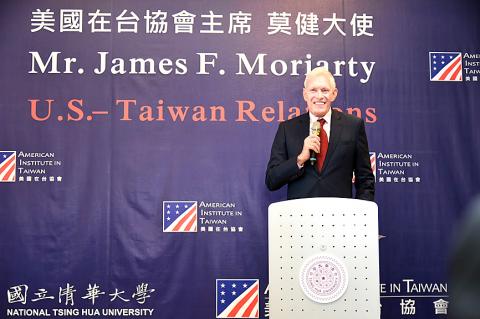The American Institute in Taiwan (AIT) on Thursday posted on Facebook an interview AIT Chairman James Moriarty did with Television Broadcasts Satellite (TVBS), after the channel pulled it from its programming lineup one day after airing.
TVBS conducted the interview with Moriarty in Taiwan last week.
During the interview, Moriarty warned about external forces attempting to manipulate public opinion ahead of the nine-in-one local elections on Saturday.

Photo: Hung Mei-hsiu, Taipei Times
Unlike most of the station’s news reports, which are aired repeatedly throughout the day and sometimes the following day, TVBS broadcast the interview only once — during the 5pm segment on Nov. 9.
The Chinese-language online Next Magazine on Friday reported that TVBS shelved the interview in a “forced disappearance,” saying that there were hidden reasons why the station decided to stop airing the interview.
TVBS slammed the report as a biased departure from the facts, saying that it was unsubstantiated reporting that disregarded journalistic ethics.
The AIT, the US’ de facto embassy in Taiwan in the absence of formal diplomatic ties between the two nations, on Thursday posted the interview on Facebook.
The reason the interview was pulled from the lineup can only be answered by TVBS, AIT spokeswoman Amanda Mansour was quoted as saying by the Central News Agency yesterday.
According to a source familiar with Taiwan-US relations, speaking on condition of anonymity, the AIT posted the interview to emphasize Moriarty’s warning that external forces would attempt to manipulate public opinion regarding the election.
Asked about Moriarty’s warning, Democratic Progressive Party (DPP) New Taipei City mayoral candidate Su Tseng-chang (蘇貞昌) said that the elections are Taiwan’s business alone and embody its democratic values.
The observations by “our friend from the US are a reminder to Taiwanese that they should do more to defend these values and must not let external forces succeed in their goal” of meddling in Taiwan’s elections, he said.
DPP Kaohsiung mayoral candidate Chen Chi-mai (陳其邁) said it is a fact that China has repeatedly meddled in the elections.
Chinese Nationalist Party (KMT) Taipei mayoral candidate Ting Shou-chung (丁守中) said that voters must be vigilant and resilient against the influence of external forces.
Emphasizing the importance of economic development and quality of life, Ting added that people should vote for candidates who can best provide them with a high standard of living.
This story has been updated since it was first published to clarify that the comment about the AIT wanting to emphasize Moriarty’s warning was not made by the AIT spokeswoman.

MAKING WAVES: China’s maritime militia could become a nontraditional threat in war, clogging up shipping lanes to prevent US or Japanese intervention, a report said About 1,900 Chinese ships flying flags of convenience and fishing vessels that participated in China’s military exercises around Taiwan last month and in January last year have been listed for monitoring, Coast Guard Administration (CGA) Deputy Director-General Hsieh Ching-chin (謝慶欽) said yesterday. Following amendments to the Commercial Port Act (商港法) and the Law of Ships (船舶法) last month, the CGA can designate possible berthing areas or deny ports of call for vessels suspected of loitering around areas where undersea cables can be accessed, Oceans Affairs Council Minister Kuan Bi-ling (管碧玲) said. The list of suspected ships, originally 300, had risen to about

DAREDEVIL: Honnold said it had always been a dream of his to climb Taipei 101, while a Netflix producer said the skyscraper was ‘a real icon of this country’ US climber Alex Honnold yesterday took on Taiwan’s tallest building, becoming the first person to scale Taipei 101 without a rope, harness or safety net. Hundreds of spectators gathered at the base of the 101-story skyscraper to watch Honnold, 40, embark on his daredevil feat, which was also broadcast live on Netflix. Dressed in a red T-shirt and yellow custom-made climbing shoes, Honnold swiftly moved up the southeast face of the glass and steel building. At one point, he stepped onto a platform midway up to wave down at fans and onlookers who were taking photos. People watching from inside

Japan’s strategic alliance with the US would collapse if Tokyo were to turn away from a conflict in Taiwan, Japanese Prime Minister Sanae Takaichi said yesterday, but distanced herself from previous comments that suggested a possible military response in such an event. Takaichi expressed her latest views on a nationally broadcast TV program late on Monday, where an opposition party leader criticized her for igniting tensions with China with the earlier remarks. Ties between Japan and China have sunk to the worst level in years after Takaichi said in November that a hypothetical Chinese attack on Taiwan could bring about a Japanese

The WHO ignored early COVID-19 warnings from Taiwan, US Deputy Secretary of Health and Human Services Jim O’Neill said on Friday, as part of justification for Washington withdrawing from the global health body. US Secretary of State Marco Rubio on Thursday said that the US was pulling out of the UN agency, as it failed to fulfill its responsibilities during the COVID-19 pandemic. The WHO “ignored early COVID warnings from Taiwan in 2019 by pretending Taiwan did not exist, O’Neill wrote on X on Friday, Taiwan time. “It ignored rigorous science and promoted lockdowns.” The US will “continue international coordination on infectious